This guest post by RAJINDAR SACHAR comes to us via the PEOPLE’S UNION FOR CIVIL LIBERTIES.
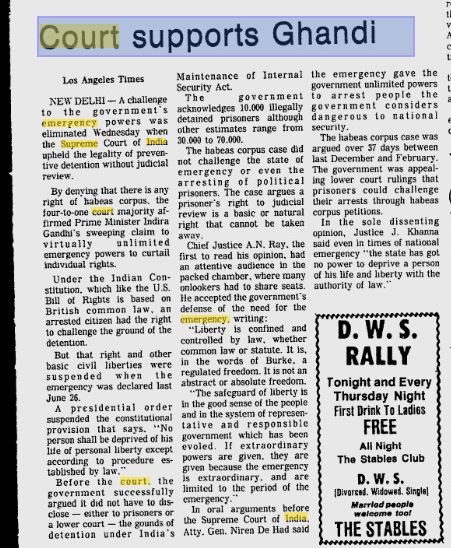
Nations which do not remember their immediate past are in danger of repeating their tragic mistakes. This thought came to me on June 26th, 2013 (the Emergency day of 1975) when on random questioning of age group of 35 in the country (who are said to make up about half the population) I found that most of them did not know of any particular significance of the day – and more tragic, fairly large number of people above the age of 35 fared no better.
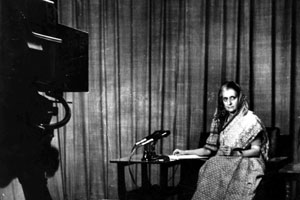
The reason was obvious. Most of the population get their information from newspapers, which with commercial angle in view never fail to remind us of Valentine’s day. But on 26th June, the newspapers did not even have a small news item in their paper – leave apart on the front page. Even many opposition parties which were the victims of Emergency chose to keep low key. Even though PUCL and other civil liberties organizations held protest meetings as usual, but news TV and newspapers avoided any mention, overwhelmed as they are with the government’s neo-liberal policies. Or is it a sense of fear because the perpetrator of Emergency was the ruling party – so much for freedom of press.
It was the day when India lost its democracy. The US President sarcastically boasted that USA was now the largest democracy. It is a different matter that thankfully, because of the sacrifices made by the Indian people under the inspiring leadership of Jai Prakash Narain (J.P.), the boast of USA President was to end, but only after 18 months.
The wounds have remained – the danger of it being repeated in the same manner may have been eliminated but a clearly concealed kind of version by the government in using the various security legislations against human rights activist and trade unionists continues to haunt us.
Question is often asked how come emergency could happen notwithstanding our constitution giving us all the fundamental rights and democracy being a basic feature of constitution as so refreshingly held in Kesavananda Bharati case as far back in 1973 by our Supreme Court.
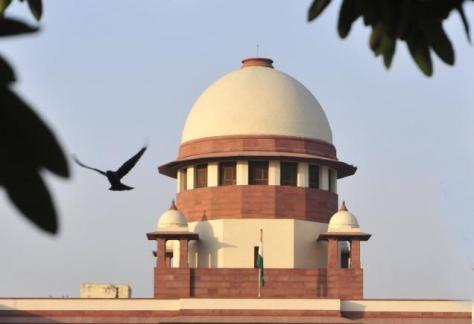
It is not that there was no resistance to the Emergency. Thousands went to jail, including former central ministers, chief ministers, governors, lawyers, legislators and a few brave journalists. Many human rights activists went underground but there is a limit to which unarmed people can fight an intolerant and a near fascist state which India had become those days. Complete fear had enveloped the country. And all this because rule of law had completely been eliminated by the Supreme Court Ruling in ADM Jabalpur case (April 1976), which overruled the view of nine High Courts that the legality of detaining order passed by the governments could still be examined – in fact in some cases the High Courts had ordered release of detenues. Had this view been upheld, emergency would have collapsed. But to our shame the Supreme Court by a majority of 4 judges against one honourable exception (Khanna J.) laid down a proposition of law, which for ever will remain a hall mark of shame:
“In view of the Presidential Order dated June 27, 1975 no person has any locus standi to move any writ petition under Article 226 before a High Court for habeas corpus or any other writ or order or direction to challenge the legality of an order of detention on the round that the order is not under or in compliance with the Act or is illegal or is vitiated by mala fides factual or legal or is based on extraneous considerations.”
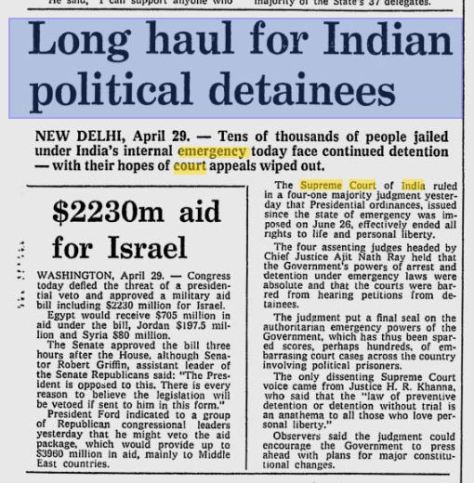
Is it not obvious that Emergency could not be fought in a legal and democratic manner because the Supreme Court accepted Attorney General’s argument that if a policeman under orders of his superior was to shoot a person or even arrest a Supreme Court judge, it would be legal and no relief available. Naturally, in this situation, no peaceful opposition to Emergency could continue. I am shocked how the majority decision could rely on Liversidge Vs. Anderson given during wartime in 1942 by House of Lords, but with a (memorable dissent by Lord Atkin) when English Courts subsequently felt so ashamed of that decision that a conscious effort was made to throw that decision in to a dung heap.
Lord Akin caustically remarked about judges who “show themselves more executive minded than the executive’ and commented that such, arguments which might have been addressed acceptably to the Court of King’s Bench in the time of Charies-I’. In fact Justice Stable a Judge of High Court London was so upset to say that the status of Judiciary had been reduced “to mice squeaking under a chair in the Home office”.
In 1963 Lord Radcliff (HL) referred dismissively to the very peculiar case in Liversidge Vs. Anderson and said “it should be confined apparently to a war time context and that it is already clear that the decision was regarded as an aberration”.
All this trenchant criticism of Liversidge was available in various law quarterly reviews since the beginning. Law Quarterly Review (1970) clearly spelled out how embarrassing the decision in Liversidge was becoming for English judiciary. That is why Lord Diplock (HL) in 1979 was constrained to rule, “For my part” I think the time has come to acknowledge openly that the majority view in Liversidge Vs. Anderson were expediently and, at that time, wrong and the dissenting judgment right”. And Lord Scarman laid final demise by saying that “the ghost of that decision need no longer haunt the law”.
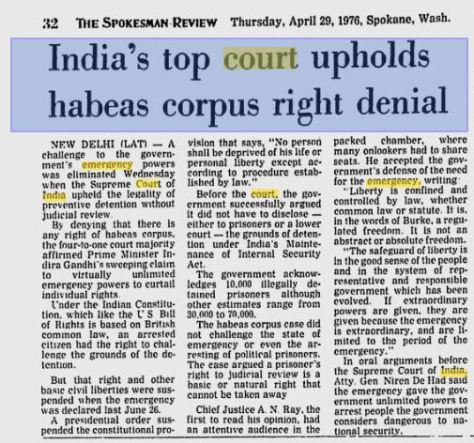
 Some commentators have ironically described majority in Liversidge case as the court’s contribution to the war effort of England – similarly many in this country are inclined to describe majority in Jabalpur case as Supreme Courts contribution to the continuance of 1975 Emergency. Had Supreme Court taken the same view as 9 High Courts, the emergency would have collapsed immediately, because no court could possibly have upheld the detention of stalwarts and patriots like Jayaprakash Narayan Ji, Morarji Desai, Raj Narain, George Fernandes, Madhu Limaya and thousands of others on the ground that they were a danger to the security of the country. The inevitable result would have been the immediate release of these leaders leading to overwhelming opposition movement which would have swept away Indira Gandhi government by mid 1976. Alas, how sometime fate of nations can be influenced by the pusillanimity of a few individuals – in this case embarrassingly by the highest judiciary which it can never live down.
Some commentators have ironically described majority in Liversidge case as the court’s contribution to the war effort of England – similarly many in this country are inclined to describe majority in Jabalpur case as Supreme Courts contribution to the continuance of 1975 Emergency. Had Supreme Court taken the same view as 9 High Courts, the emergency would have collapsed immediately, because no court could possibly have upheld the detention of stalwarts and patriots like Jayaprakash Narayan Ji, Morarji Desai, Raj Narain, George Fernandes, Madhu Limaya and thousands of others on the ground that they were a danger to the security of the country. The inevitable result would have been the immediate release of these leaders leading to overwhelming opposition movement which would have swept away Indira Gandhi government by mid 1976. Alas, how sometime fate of nations can be influenced by the pusillanimity of a few individuals – in this case embarrassingly by the highest judiciary which it can never live down.
(Justice (Retd.) Rajinder Sachar is former chief justice of the Delhi High Court.)
See also:
- Indian Express: 35 years later, a former Chief Justice of India pleads guilty
- Sohail Hashmi: A memorable evening with Vidya Charan Shukla
- Sohail Hashmi: My Days in Tihar Jail

Speak for yourself or the others you spoke to on that day. There is still a minority that heeds the thoughts of Santayana that you have correctly mentioned in the first line. I belong to that age bracket, but I have been constantly aware of recent history and share your frustration at the lack of awareness among those of my generation. Maybe they think it is best forgotten. That is not to say that I carry the vendetta on, or that we cannot move on. Still, it is utterly depressing that most of my compatriots don’t even remember that blot on our history. What is even worse is that the latest generation, which would dance around to pseudo-movements in favour of a “second independence struggle” don’t even remember what took place just a few years before they were born and act as if they have re-invented the concept of struggle.
Lest you feel that all is lost, let me remind you that insignificant people like me don’t allow that memory to fade away. It may not be in the popular thinking these days, but rest assured people do remember – a few. And that should be enough.
LikeLike
One addendum – I share your despondence at the state of the current generation. With a hilarious event.
My college hosted the Justice KS Hegde awards (his illustrious son, Justice Santosh Hegde may be well known to you, but not the saffron-tinted industrialist brother and his cohorts who runs a group of institutions here).
Ridiculously, the first recipients were Medha Patkar AND YV Chandrachud. I was an active member of the student community and I remember protesting the award. Unfortunately for me, the rest of the student community was filled with ignorant asses who thought I was being a “pain in them” :)
None of them understood the reason for my protest for the incongruous list of awardees. Sadly, I was the lone missing person in all the functions and ceremonies. To this day, it makes me feel a little ashamed that none of my classmates or contemporaries even bother to find out why I found it ridiculous that an award named after the first BJP speaker of the country was being given to someone who agreed that we had no right to live at all. That we were citizens of this country and our life was owned by the nation. Anyways, it is sad, I agree. More people should try and learn a little more about those dark days. Not going to happen I know, but still there is always hope…
LikeLike
Not to put you on the defensive, but how did you protest? Was it just a boycott or did you spend time talking to people (one on one) to explain why the situation was ridiculous? You know, recruit them to the cause & such.
Because it’s all well and good to make sweeping generalizations about perceived ignorance but given our education system, it is really hard to come by even what others term as general knowledge.
I mean, call me lazy or ignorant but the only reason I actually learnt of the emergency was because of a Civics teacher cited an incident from the time as an example for Habeas Corpus. There wasn’t really anything about the time period in our textbooks and noone we knew discussed it (I don’t include vague references) as it was too “recent” to be history but not enough to be current events.
I’m sure the knowledge was there if looked for but at a time when the internet was too new to be of use, you had to be Really interested in the topic to go find it. And for a topic to capture interest, well, I don’t think I’ve solved that mystery yet :/
LikeLike
PS: not trying to explain away the ignorance itself. It’s just that your post struck me as a little bit on the cynical side of things. I accept that there is a lack of awareness but it doesn’t hurt to try addressing why it’s there in the 1st place.
LikeLike
You are right. It is cynical. Maybe that is what happened to all of us, we became cynical. I wish it weren’t so. I feel it is probably the home environment more than anything else that nurtures our political or social ideals. Probably where our cynicism originates too. Think about it, most of our ideas are shaped by what we heard from our elders or our relatives. Whatever comes later as learned knowledge is still coloured through that prism. Sometimes we may try to militate against whatever our elders believed in and follow the opposite path, but that usually happens because of acquired knowledge or the influence of people who are far more vocal or convincing or influential. On the other hand, it could lead to an extreme position of the timid politics of our predecessors.
About the college event itself, it was rather sad because as you said I did try to point out the events and the incongruity. However, there was some sort of incredulous backlash – “So what? It happened so long ago. This is going to be a fun event and our college will be in the papers.” Yes, there was no internet or google search to read up on the matter. But I find it strange that even when it became known to them, it hardly seemed to matter.
It is what I felt when my uncle, a businessman, told me that liberalization was the way ahead (PVN Govt and Manmohan Singh’s first stint). When I pointed out that it would lead to a greater divide between the haves and have-nots and asked him “How can the poor survive?” and he replied “Let them die. Are they needed at all?”
The insensitivity was appalling, but what was even worse was the blind faith he had that he would not be the one to suffer. My concern is that education has not made us aware or upright citizens. In fact, the opposite has happened. We are more inclined to view Gods and myths as far more real than reality. Every superstition is more powerful today. Temples and reconstruction of old temples is more important than education (in fact, that is one of the issues I am fighting in my village presently where my people spent nearly 2 crores on rejuvenating a 400 year old daivasthana which needed no repairs, but are adamant that the 100 year old school that our ancestors built ought to be demolished and turned into commercial space). Look at the way we behave in public spaces – we are more savage than the barbarians who had no education. Moral policing might be reasoned off as a class divide of sorts and thus the cause of all the strife. But even the educated ones who protest timidly, pseudo-sheepishly in public in the aftermath of such events, confide privately that the boys and girls who were beaten up deserved to be “put in place”.
Pardone, my cynicism moves me to rants almost all the while. But you do see why it is so?
You mentioned a civics teacher who taught you the events regarding habeas corpus. I laud the teacher and I am glad you took it to heart. How many such teachers have you known? I am sure, not many.
I once interrupted an economics teacher while doing my engineering and got into a debate with him about economic policies and inflation. So he spent the best part of an hour debating it with me. For his trouble he was reported to the principal for not doing his job. It was hilarious. Some of the students told the principal that he wasted time in class arguing irrelevant matters. Spoon fed ignoramuses wanted notes and theory rather than real knowledge. I know I am a weirdo in some ways. But I would rather have that than the textbooks alone. (Come to think of it, economics as a subject in engineering was not what you would call sensible. Given the kind of students who do engg).
It is not that there is no way of accessing knowledge, it is that the later generations eschew learning any more than they are forced to. What matters is what to do in the vacations, what clothes to wear, how to be a part of the “in-crowd” and how to do “happening” things. Very superficial, very trite.
I am sorry for this long reply. I am sure you have better things to do than read more of my nonsense. However, I am thankful to you for being a little more optimistic than I. It is a grievous fault in me. I wish I could be hopeful once more. Thank you for writing, your polite questions made me think. Brought back memories from nearly two decades ago. I hope you are a teacher :) You’d be a good one.
Thanks
LikeLike
It’s true that ideas & character originate at home. But I’d say it was more “incomplete education” that causes the regressive behaviour you speak of.
I mean, from day 1 we’re told that information will be spoonfed and the also-incomplete-textbooks are all the source we need. Combine that with the “insensitivity” (or self-absorption) that’s learnt at home, we think knowledge is only as important in as it affects us, directly or for the exams we write. And then, when the world confronts us with our own ignorance, we react the only way we know how: disdain, disbelief and depending on the person, mockery or anger.
But the thing is, if information wasn’t just handed out according to the whims of the instructor, we wouldn’t have to rely completely on other people’s (usually coloured) opinions to form our own. As mentioned, I had a normal schooling within the “spoonfeeding” system, absolutely no interest in the outside world and a go-to response of mockery when crossed.
My brother on the hand, went through a more self-reliant system. Barely any textbooks, do-it-yourself assignments and grading based on substance over the actual subject matter. And while it still resulted in half-baked opinions, way too much self-assurance and a go-to-response of mockery when crossed, at least he knows enough to cross-check sources instead of blindly believing what he thinks or is told. And at a much younger age than I was when I finally started to wake up to life in general :)
LikeLike
Thank you, Justice Sachar, for this article. I am a young citizen of this country and extremely engaged in its history and the development of its ‘democratic’ institutions. The period of the emergency remains a very curious time for me and since it happened twenty two years before I was born, my family/relatives/friends of family etc. who lived through the time are constantly questioned for their experiences. I also turn to literature. Rohinton Mistry’s fictional novel called, A Fine Balance’, based in the Emergency is a most telling tale. I do agree that most in my generation seem to have no clue of that difficult time. Despite the knowledge of general disinterest, I was genuinely surprised at the lack of discussion and debate on June 26th.
LikeLike
Wow, you are just 16. I am humbled. There is hope yet, then. I must laud your taste in literature too. But most of all, humbled. In our arrogance we think that the rest of the world is filled with youngsters who are naive or ignorant. Thank you for correcting me.
LikeLike
I do also see the deliberate blocking of memory of the Emergency by those who are over 40 years of age. But there surely must be some who are conscious of what happened during those ugly months, but due to daily survival-related chores are not able to take time out to express their solidarity with those holding the protests. The media, too, does not go out and seek their voices. Anyways, I am confident these people, who do know but are unable to participate in protests, will be wary of any future machinations by the Supreme Court, in conjunction with the ruling government, to impose Emergency once again, and do whatever they can to the best of their abilities. This much I am confident of.
The other bright spot is that section of the young generation, who even if they may not be clued in on what exactly happened during the Emergency, will, however, rise to the occassion to protect the constitutional rights of the people of India.
LikeLike
Without being egregious thereafter, India’s judiciary has adhered to the precept of “balance of convenience” as the lode star of jurisprudence. Procrastination is even more convenient than finding the law too trivial to enforce..
LikeLike